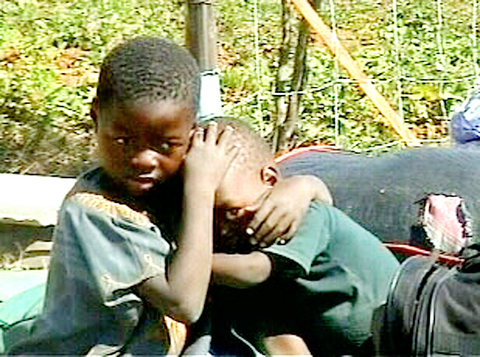The Church of England demanded on Saturday that the British government stop its forced removal of asylum seekers to troubled Zimbabwe.
The call came as a Cabinet rift over this emotive issue threatened to widen, with ministers understood to have expressed profound concerns about the government returning people to a country whose President, Robert Mugabe, is under attack for abuses of human rights.
One senior government source said the Home Office (interior ministry) policy of forced returns was "outrageous." The disquiet comes as fears grow over conditions in Zimbabwe, where the homes of opposition activists have been razed to the ground by Mugabe's soldiers recently.

PHOTO: AP
"The worsening situation as Mugabe bulldozes people's homes means that we can't guarantee people's safety. I find it incredible that we are still sending people back," the government source said.
The Church's call for the government to act was unusual. "There is suffering and danger facing those asylum seekers deported to Zimbabwe," a spokesman said.
"The situation there demands a compassionate response from our government and an urgent reassessment of their policy," he said.
It is understood some Foreign Office officials have privately expressed alarm that the Home Office is continuing with the returns.
One official was quoted this weekend as saying that the Home Office needed to explain "why they think it is a safe place to send anyone who has defied Mugabe."
The government ended a two-year ban on these enforced removals last November on Foreign Office advice. But it is believed the worsening situation in Zimbabwe has prompted calls for a rethink.
The Labour MP Kate Hoey, who paid a visit to Zimbabwe earlier this year, called on the Home Secretary, Charles Clarke, to act.
"The officials I speak to keep saying that this is a political decision. In the end Charles Clarke will have to be involved," Hoey said.
"No one is suggesting these people be given the right to stay for ever but the situation has deteriorated so much that we can't send people back. Anyone coming off a plane in Zimbabwe from Britain is seen as anti-Mugabe," she said.
The continued removal has sparked protests in asylum centers across the UK. Yesterday scores of Zimbabweans in the centers completed the third day of a hunger strike.
They were angry at the decision to remove a well-known opponent of Mugabe, Crispen Kulinji, who is being held at Campsfield detention center in Oxfordshire.
Following a parliamentary question tabled by Hoey, Kulinji's removal, scheduled for 10.30pm Saturday night,was deferred. Campaigners have also raised concerns about conditions in the centers.

Auschwitz survivor Eva Schloss, the stepsister of teenage diarist Anne Frank and a tireless educator about the horrors of the Holocaust, has died. She was 96. The Anne Frank Trust UK, of which Schloss was honorary president, said she died on Saturday in London, where she lived. Britain’s King Charles III said he was “privileged and proud” to have known Schloss, who cofounded the charitable trust to help young people challenge prejudice. “The horrors that she endured as a young woman are impossible to comprehend and yet she devoted the rest of her life to overcoming hatred and prejudice, promoting kindness, courage, understanding

US President Donald Trump on Friday said Washington was “locked and loaded” to respond if Iran killed protesters, prompting Tehran to warn that intervention would destabilize the region. Protesters and security forces on Thursday clashed in several Iranian cities, with six people reported killed, the first deaths since the unrest escalated. Shopkeepers in Tehran on Sunday last week went on strike over high prices and economic stagnation, actions that have since spread into a protest movement that has swept into other parts of the country. If Iran “violently kills peaceful protesters, which is their custom, the United States of America will come to

‘DISRESPECTFUL’: Katie Miller, the wife of Trump’s most influential adviser, drew ire by posting an image of Greenland in the colors of the US flag, captioning it ‘SOON’ US President Donald Trump on Sunday doubled down on his claim that Greenland should become part of the US, despite calls by the Danish prime minister to stop “threatening” the territory. Washington’s military intervention in Venezuela has reignited fears for Greenland, which Trump has repeatedly said he wants to annex, given its strategic location in the arctic. While aboard Air Force One en route to Washington, Trump reiterated the goal. “We need Greenland from the standpoint of national security, and Denmark is not going to be able to do it,” he said in response to a reporter’s question. “We’ll worry about Greenland in

PERILOUS JOURNEY: Over just a matter of days last month, about 1,600 Afghans who were at risk of perishing due to the cold weather were rescued in the mountains Habibullah set off from his home in western Afghanistan determined to find work in Iran, only for the 15-year-old to freeze to death while walking across the mountainous frontier. “He was forced to go, to bring food for the family,” his mother, Mah Jan, said at her mud home in Ghunjan village. “We have no food to eat, we have no clothes to wear. The house in which I live has no electricity, no water. I have no proper window, nothing to burn for heating,” she added, clutching a photograph of her son. Habibullah was one of at least 18 migrants who died